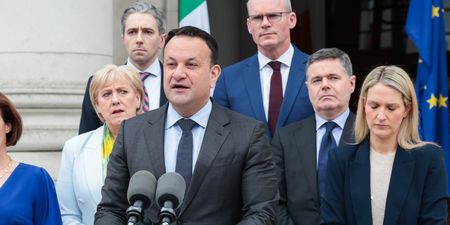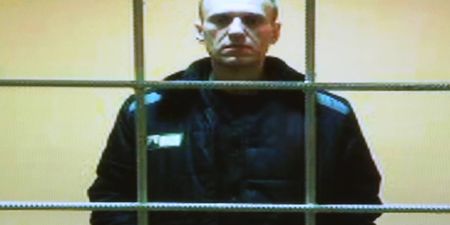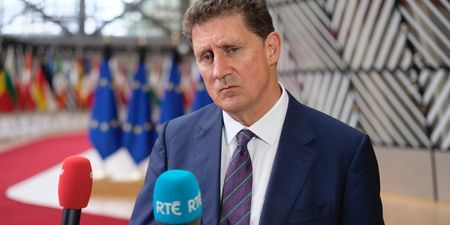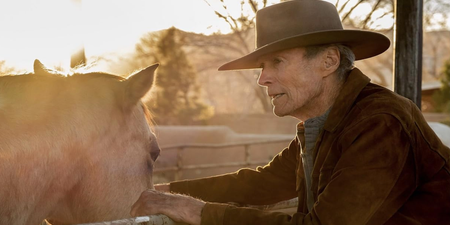Imagine a nation in Western Europe where tension exists between two different ethnic groups.
By Conor Hogan
Imagine a nation where walls are spray-painted, and an orange movement is alive and well. Picture battles on the streets in the towns, and in the schoolyards.
Visualize the people living in these towns. The majority ethnic group trying to preserve their own cultural identity by stopping the minority ethnic group from practising theirs. The minority being accused of not trying hard enough. Imagine the minority becoming the majority in some areas, and for tensions to arise out of that.
Picture a country, created artificially out of necessity. A country split between the North and the South. Where some people want a divided nation, and others want a united one.
Visualize a country where politics are extremely partisan, where residents only vote for people in their own ethnic group. A country where agreements between political parties are hard to negotiate, and governments take a long time to form.
The country in question isn’t Ireland or Northern Ireland. It’s Belgium, the land best known for chocolate, Audrey Hepburn, waffles, beer and not a whole lot else.
Dull
Belgium, a land that some believe to rather dull, is actually in the middle of a civil war.
The war in question is a war of words. The battles on the streets, are directed generally towards street signs rather than people. The chances of bloody violence breaking out are rather slim. But tension certainly exists, and, superficially at least, the tension isn’t because of religion or skin colour, but the language people speak.
In a nutshell: the north, Flanders (where the majority live) has Flemish (a dialect of Dutch) as its main language; the South, Wallonia, has French.
Both languages have been recognised as equal official languages by the state since 1898, but the insertion of official language areas into the constitution in 1970 (which gave language communities powers to regulate the use of the language in their areas) has complicated this, especially in areas surrounding the capital city.
Brussels, which has an almost 80s West Berlin-like existence (where half the city was a part of West Germany, despite the city being situated in East Germany), is situated in Flanders, but the majority of the population there speak French.
And so the two communities have coexisted… until recently.
Wallonian students are banned from speaking French in the yard, while town Mayor Francis Vermeiren has banned his staff from speaking any language other than Dutch.
In May, a local restaurant received a letter from the Overijse council, which read: “As you know, this is a Flemish commune, whose official language is Dutch. However, we notice that your neon sign, ‘Thai takeaway’, is in English only. We would like to request that you change this to ‘Thai meeneemrestaurant’. We are also asking you to greet your customers in Dutch ‘Goede dag’ or ‘Goede avond’, instead of just in French.”
Wallonian students in a school in the town of Zaventum (home of the Brussels airport), are banned from speaking French in the yard, while town Mayor Francis Vermeiren has banned his staff from speaking any language other than Dutch (and has set a Dutch language requirement for anyone buying cheap land from the borough council).
Pro-Flemish language groups, such as the Taal Aktie Komitee (TAK), focus on sabotaging non-Dutch billboards and facilities. An owner of a business in Overijse has resisted official requests to change his English-language sign – “textile repair shop” – and has had his billboard regularly spray-painted with “Nederlands” (“Dutch”) graffiti.
In 2005, when former European MEP Fernand Herman died, his widow was talked out of getting “L’Europe est ma patrie” as his epitaph by the funeral director, who warned her that authorities in Overijse would take a dim view of a headstone in French.
The Flemish are more northerly, and hard working. The French on the other hand, are southerly and more exuberant.
Miss Belgium 2008 Alizee Poulicek was booed on stage when she revealed on live TV that she couldn’t speak Dutch, drawing scorn from Flemish media. The situation has gotten so tense, that recent Belgian Eurovision entries have been sung in gibberish, in an effort to avoid offending either community.
“Person to person we are fine, but people are not very happy.” Sonja Tattayn, a Flem living in Overjise tells us. “Wallonians take everything for granted. They find it normal that Flemish people speak French to them.”
“Some try, but others don’t. Some French are slowly trying, but the Flemish always tried and are perhaps tired of being the nice people. It’s terrible being in your own capital city and to have most of the people not be able to speak your language.”
She believes, however, that language isn’t the only thing that divided the two peoples. “The Flemish are more northerly, and hard working. The French on the other hand, are southerly and more exuberant.â€
The situation between the two has become even more complicated recently, following the Belgian Elections on the 13 June. Flemish Separatist Party the N-VA (New Flemish Alliance Party) won 27 of the 150 seats in the lower chamber, making it the largest party in the country, and giving it the right to attempt to form a coalition.
It‘s an enormous swing for the N-VA, who’ve gone from getting only 3% of the national vote in 2003, to nearly 18% this year (and 30% in the senate). Putting this in context, it would be the equivelent of the BNP becoming the largest party in the next UK genaral election.
Francophone daily newspaper Le Soir, deemed their ‘Tsunami’ victory as one that could undermine the foundations of the Belgian state. A French-speaking Wallonian hotelier in majority-Flemish Tervuren told JOE, “It is not a good situation. We are all waiting to see what happens.”
Unreasonable
Looking at the situation as an outsider, it can seem like the Flemish are being unreasonable. But there is a genuine fear among them that they are becoming a minority in their own communities (there are certain areas in Flanders where over 80% of people are French speakers). Much of the resentment has a historical basis (French was the official language of Belgium after its formation, despite being spoken only by the minority).
Sonja Tattyn insists, however, that while many voted for the N-VA, most Flemish people do not want a separate Flanders and Wallonia. “70-80% of people who voted for the N-VA do not want a divided Belgium.”
“It was a protest vote against the traditional parties, who never seem to do anything. They didn’t think the N-VA would persist with the idea of separatism. Maybe it was short-sighted.â€
Asked about how she thinks the N-VA will do in coalition she says, “They’ll have to compromise to go into coalition with the more traditional parties, so they can realise their programme. They’ll probably lose in the next election.â€
This election is set to drag on, however (it took nearly six months after the last one for a coalition to be formed). The second biggest party are the Wallonian Parti Socialiste, and it is unlikely they could reach any agreement.
N-VA will have to make a deal with at least two other parties to form a majority government and will probably find very few to go along with their seperatism idea.
The other Flemish parties are probably more likely to give their backing to a Parti Socialiste minority government, and might have to, as the combined Flemish total without the N-VA is only 57 seats (38% of the total).
So the next time you go to Belgium, you won’t have to worry about pipebombs going off, and probably won’t encounter any fighting on the streets. But be aware that it is still an area of tension, and that there is a kind of civil war going on. A war of words.
Our advice, speak English.
LISTEN: You Must Be Jokin’ with Aideen McQueen – Faith healers, Coolock craic and Gigging as Gaeilge

















































